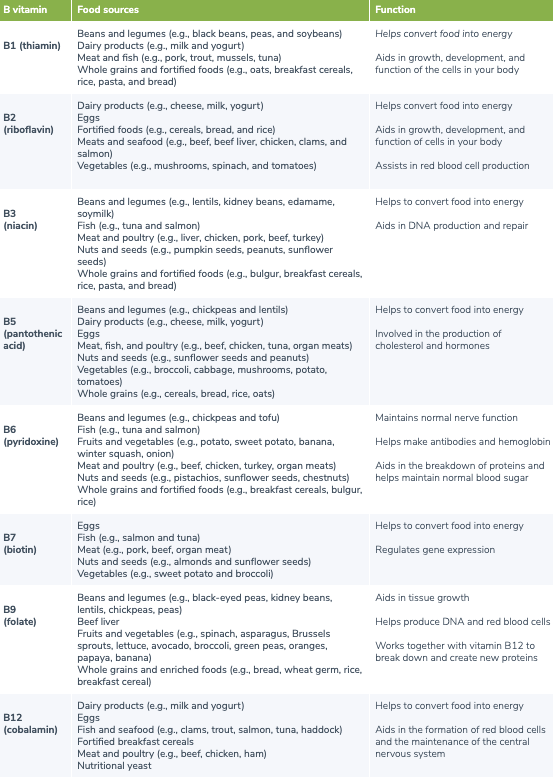When I was a very young Physical Therapist I worked in this Family Medicine Clinic and old people would come in regularly for the B12 shot. They always looked happy and said it gave them energy and made them feel young.
Fast forward to older age, older parents. Older, maybe wiser.
Maybe not.
Two people close to me have recently had blood work done and it has come up with B vitamin issues.
B vitamins are water soluble vitamins.
Stuff is either fat soluble or water soluble. Whether talking about making lip balm or nutrients we put in our bodies, most things are either fat or water soluble. Fat soluble things that we eat or drink, ingest, are not only absorbed aided by fat but they are also stored in the body in our fat.
Water soluble vitamins are fragile and are typically not stored because we might be composed of large amount of water but we are not water beds, water goes in and out. We wish that happened with fat, but fat stores.
B vitamins are water soluble. A body needs them every day.
There are 8 B vitamins. The chart above shows the names, how they function and what foods provide the nutrient. In older adults, the abnormalities shown in blood work results are often low B9 (folate) and B12 (cobalamin). A healthy body doesn’t need a lot of any B vitamin so diet is usually sufficient.
B vitamins come from either diet or supplementation. Supplementation is not recommended unless a physician orders it. However looking at the list of signs of deficiencies, a multivitamin vitamin including B complex does not seem unreasonable.
What’s surprising is the list of what a shortage in B vitamins could lead to. I’m going to use quotes followed by a brief conclusion.
“Low levels of thiamin is common in individuals with type 2 diabetes. Supplementing with thiamin may be beneficial in the treatment and prevention of type 2 diabetes”
“Early symptoms of deficiency can include weakness, fatigue, mouth pain, burning eyes and itching.” (B2, riboflavin)
B3. “Niacin deficiency can result in “pellagra”, skin rashes being a symptom, together with vomiting, diarrhea, depression, fatigue and loss of memory”
“Niacin’s neuroprotective properties may prevent some age-associated neurological diseases, such as Alzheimer’s and Parkinson’s disease”
B5 Pantothenic acid may lower cardiovascular disease risk by reducing total cholesterol and LDL cholesterol. (12) Furthermore, dietary intake of pantothenic acid has been shown to reduce C-reactive protein (CRP), an inflammatory marker that contributes to the development of atherosclerosis (hardening of the arteries)
Vitamin B6, less commonly known as pyridoxine, has many important functions in the body, including maintaining normal nerve function, assisting in antibody and hemoglobin production, and maintaining healthy blood sugar.
Deficiency of B6 can result in “skin changes and possibly anemia”
Vitamin B7 is more commonly known as biotin. It works with vitamin B5 (pantothenic acid) to synthesize and break down fats. (36) Biotin is commonly associated with healthy hair and nail growth, although research is limited.
Supplementing with folic acid may also improve cognitive function in adults. One study found that folic acid supplementation over a two-year period increased verbal IQ and decreased beta amyloid buildup, a type of protein that contributes to impaired brain function and the progression of Alzheimer’s disease. (14)
Vitamin B deficiency, particularly B6 and B12, can cause irritability in children. Vitamin B6 is important for brain development and immune function, and a deficiency can lead to mood swings and irritability in older children. Similarly, vitamin B12 is necessary for neurological function, and its deficiency can cause irritability and other neurological symptoms.
Children who are deficient in vitamin B12 may also experience fatigue, headaches, and irritability.6 These symptoms can be caused by the lack of red blood cell formation and neurological function support provided by vitamin B12.
Sources: https://www.sciencedirect.com/topics/agricultural-and-biological-sciences/vitamin-b-deficiency ,
https://fullscript.com/blog/b-vitamins
B vitamins are not stored by the body, except for B12 which is stored in the liver. Older adults are often deficient in B12. A healthy diet will provide enough B vitamins, theoretically. As I was reading about the B vitamins, some articles mentioned indicators of deficiency being rashes, skin issues, irritability in children and mood swings in adults, and then less ambiguous things like decreased cognition and cataracts.
Studies show depression and PMS are helped by supplementation. B vitamins support multiple bodily systems and are necessary for metabolism and energy production. They do not supply the energy but allow the body to make energy. B vitamins also help to make new DNA.
Toxicity is not normally an issue but making sure a daily diet includes Vitamin B foods is wise.
Alcohol depletes B vitamins and the ability to utilize the B vitamins in food. People who regularly drink should consider supplementation. B vitamins can also interact with some medications so this is not an uncomplicated issues, however the number of signs of deficiency and the prevalence in people indicate that this should be looked at.
In case you’re wondering, according to AI, a B12 shot lasts about one week. I was wondering.
.






Always enjoy your informative and useful posts. Very considerate of y'all to post the reference links as well. Thanks for the handy chart of the different Bs
Thank you for this B vitamin information. I like the chart. Helps to explain all those B’s and the importance of each. Thank you ….great information!